Africa
On Tuesday, the African Union announced the suspension of Mali and threatened to slap sanctions on the West African country following a military coup last week.
The AU “decides … to immediately suspend the Republic of Mali from participation in all activities of the African Union, its organs and institutions, until normal constitutional order has been restored in the country”, the body’s Peace and Security Council said in a statement late on Tuesday.
Colonel Assimi Goita, the officer who deposed President Ibrahim Boubacar Keita last August, turned against the head of the transitional government Bah Ndaw after accusing him and Prime Minister Moctar Ouane of naming a new cabinet without consulting him.
Until last Wednesday, Goita had served as the transitional administration’s vice president.
The second coup in nine months slammed the brakes on Mali’s fragile transition and threatened to cement army rule in a country beset by poverty and a deadly militant insurgency.
The suspension is and has been the AU’s standard operating procedure since 2033 until Chad happened.
A power grab in N’djamena
Following the April 20 death of Chadian President Idriss Deby on the battlefront, the military quickly took over and announced a de facto government – the Transitional Military Council (TMC) headed by the son of the slain leader, and an 18-month roadmap to restore civilian rule.
A meeting of the AU’s Peace and Security Council (PSC), acting on a report authored by its fact-finding mission to N’djamena, on May 14 effectively endorsed the junta’s plan, contradicting the bloc’s long-standing tradition on dealing with unconstitutional seizures of power.
Malian analyst Séga Diarrah says the AU put security considerations first in reaching its decision on Chad.
“We must not forget that Mali has a democratic parenthesis, a multiparty system, whereas Chad has been ruled for thirty years and much more by the military,” Diarrah told Africanews.
Chad is a major security player in the Sahel and Lake Chad regions, contributing thousands of troops to the fight against extremist groups.
It is also seen as a buffer, shielding central African countries from the security crisis arising out of the breakdown of order in Libya.
“It exposes the African Union’s double standards”, said Obambe Gakosso, a Congolese political analyst.
“But the AU also forced the Malian army to name a civilian government back in August. It was clear that the army was uncomfortable and that this was not going to work,” Gakosso said.
The role of France
In taking over, Chad’s military violated Article 81 of the country’s constitution, which provides for the head of the National Assembly to act as interim president in such circumstances and for the holding of within 45–90 days in the event of the President’s death, resignation or incapacitation.
The army also dissolved the National Assembly and the government, and suspended the constitution, despite protests from the civil society and political opposition – crimes big enough to warrant AU suspension and sanctions.
Major powers largely ignored or tacitly endorsed the power grab, according to Diarrah.
“The French said that they were ready to accompany the Chadian regime, but for Mali, there are threats of withdrawal, threats of the end of cooperation [Operation Berkhane]”.
In Bamako, public sentiment against the presence of French troops has been hostile, something Paris has repeatedly expressed discomfort about.
French President Emmanuel Macron attended Deby’s funeral in N’djamena.
How has the AU responded to coups since 2010?
Niger: February 2010
When soldiers overthrew President Mamadou Tandja, the African Union reacted by immediately suspending Niger’s membership.
Mali: March 2012
Soldiers carried out a coup against President Amani Toumani Touré’s government prompting the bloc to immediately suspend the state membership.
Guinea-Bissau: April 2012
The African quickly suspended the small West African country after soldiers removed the interim government headed by President Raimundo Pereira.
Central African Republic: March 2013
Following months of fighting, the Seleka rebel coalition marched onto Bangui, deposing President Francois Bozize. The AU quickly suspended the CAR and announced sanctions. Pressure from the AU and major powers also saw Michel Djotodia quit as the Central African ruler months later.
Egypt: July 2013
Soldiers led by Marshal Abdel Fattah el-Sisi, the country’s current ruler overthrow president Mohamed Morsi. The AU responds by suspending the Arab country.
Burkina Faso: September 2015
As the Sahel country attempted to navigate a fragile transition forced by the departure of veteran ruler Blaise Compaore, General Gilbert Diendéré and soldiers loyal to him briefly overthrew interim president Michel Kafando, prompting outrage and suspension by the AU.
Sudan: April 2019
After months of popular protests, the Sudanese overthrew President Omar al Bashir and placed him under army detention. The African Union quickly asked the generals to hand over power to civilians but its warnings were ignored.
After a massacre of protestors in Khartoum in June, the bloc suspended Sudan.
Mali: August 2020
Soldiers led by Colonel Assimi Goita took advantage of popular protests in Bamako to depose President Ibrahim Boubacar Keïta.
The AU immediately suspended the west African country.
Only Zimbabwe was able to escape the AU's wrath when the army removed veteran President Robert Mugabe in 2017 before he 'resigned' days later in a carefully orchestrated plan to ward off international outrage.



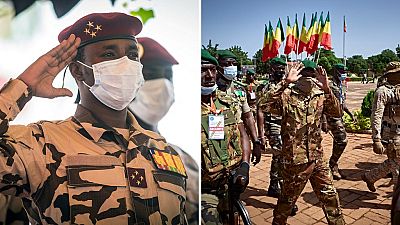

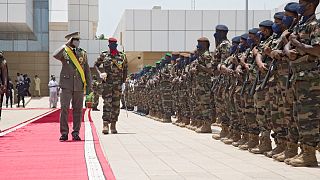
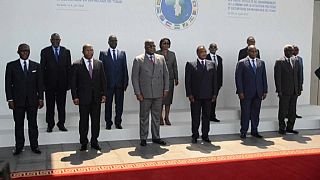
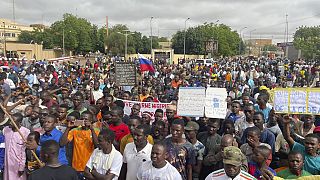
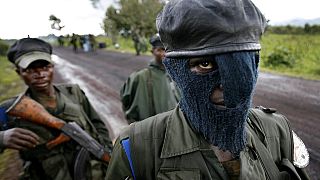


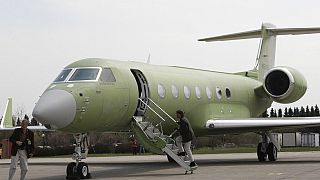
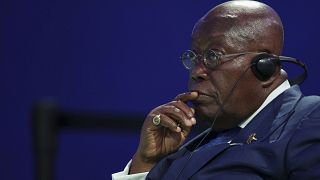
00:48
Corpses found adrift in boat off Brazil likely migrants from Mauritania, Mali - Police
01:07
Mali's junta bans media from reporting on political activities
00:51
Mali bans political party activities as calls for elections grow
01:11
UK man runs the length of Africa in 10,000 miles and 352 days
00:59
British man running length of Africa nears finish line
01:58
Chad election: Campaigns start as opposition candidates lament violations